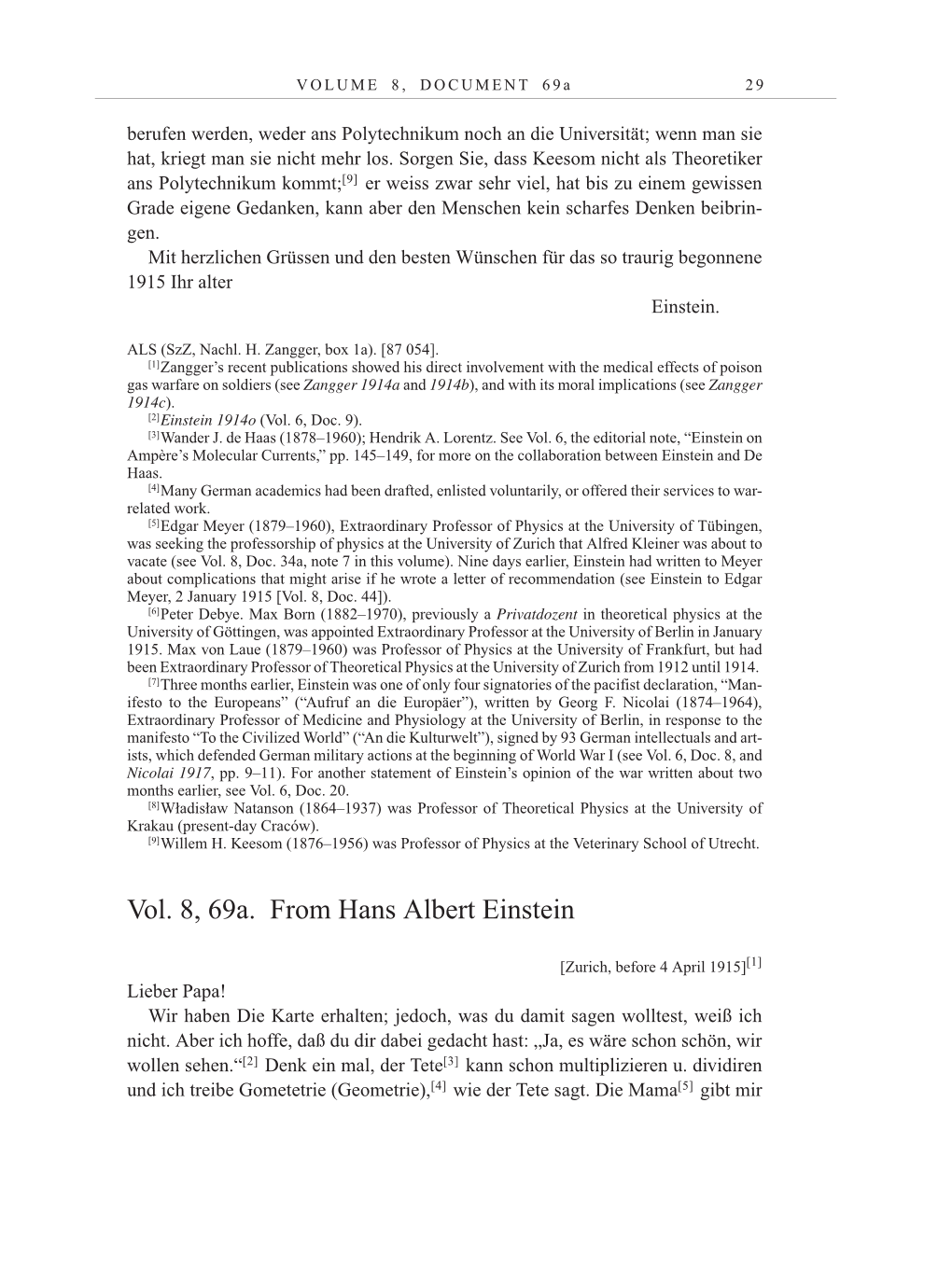V O L U M E 8 , D O C U M E N T 6 9 a 2 9
berufen werden, weder ans Polytechnikum noch an die Universität; wenn man sie
hat, kriegt man sie nicht mehr los. Sorgen Sie, dass Keesom nicht als Theoretiker
ans Polytechnikum
kommt;[9]
er weiss zwar sehr viel, hat bis zu einem gewissen
Grade eigene Gedanken, kann aber den Menschen kein scharfes Denken beibrin-
gen.
Mit herzlichen Grüssen und den besten Wünschen für das so traurig begonnene
1915 Ihr alter
Einstein.
ALS (SzZ, Nachl. H. Zangger, box 1a). [87 054].
[1]Zangger’s recent publications showed his direct involvement with the medical effects of poison
gas warfare on soldiers (see Zangger 1914a and 1914b), and with its moral implications (see Zangger
1914c).
[2]Einstein 1914o (Vol. 6, Doc. 9).
[3]Wander J. de Haas (1878–1960); Hendrik A. Lorentz. See Vol. 6, the editorial note, “Einstein on
Ampère’s Molecular Currents,” pp. 145–149, for more on the collaboration between Einstein and De
Haas.
[4]Many German academics had been drafted, enlisted voluntarily, or offered their services to war-
related work.
[5]Edgar Meyer (1879–1960), Extraordinary Professor of Physics at the University of Tübingen,
was seeking the professorship of physics at the University of Zurich that Alfred Kleiner was about to
vacate (see Vol. 8, Doc. 34a, note 7 in this volume). Nine days earlier, Einstein had written to Meyer
about complications that might arise if he wrote a letter of recommendation (see Einstein to Edgar
Meyer, 2 January 1915 [Vol. 8, Doc. 44]).
[6]Peter Debye. Max Born (1882–1970), previously a Privatdozent in theoretical physics at the
University of Göttingen, was appointed Extraordinary Professor at the University of Berlin in January
1915. Max von Laue (1879–1960) was Professor of Physics at the University of Frankfurt, but had
been Extraordinary Professor of Theoretical Physics at the University of Zurich from 1912 until 1914.
[7]Three months earlier, Einstein was one of only four signatories of the pacifist declaration, “Man-
ifesto to the Europeans” (“Aufruf an die Europäer”), written by Georg F. Nicolai (1874–1964),
Extraordinary Professor of Medicine and Physiology at the University of Berlin, in response to the
manifesto “To the Civilized World” (“An die Kulturwelt”), signed by 93 German intellectuals and art-
ists, which defended German military actions at the beginning of World War I (see Vol. 6, Doc. 8, and
Nicolai 1917, pp. 9–11). For another statement of Einstein’s opinion of the war written about two
months earlier, see Vol. 6, Doc. 20.
[8]W¬adis¬aw Natanson (1864–1937) was Professor of Theoretical Physics at the University of
Krakau (present-day Craców).
[9]Willem H. Keesom (1876–1956) was Professor of Physics at the Veterinary School of Utrecht.
Vol. 8, 69a. From Hans Albert Einstein
[Zurich, before 4 April
1915][1]
Lieber Papa!
Wir haben Die Karte erhalten; jedoch, was du damit sagen wolltest, weiß ich
nicht. Aber ich hoffe, daß du dir dabei gedacht hast: „Ja, es wäre schon schön, wir
wollen
sehen.“[2]
Denk ein mal, der
Tete[3]
kann schon multiplizieren u. dividiren
und ich treibe Gometetrie
(Geometrie),[4]
wie der Tete sagt. Die
Mama[5]
gibt mir
